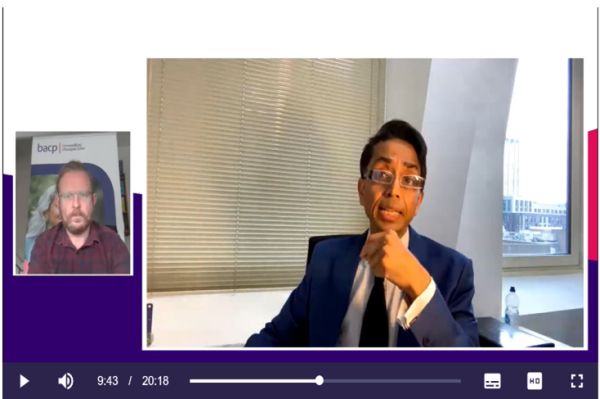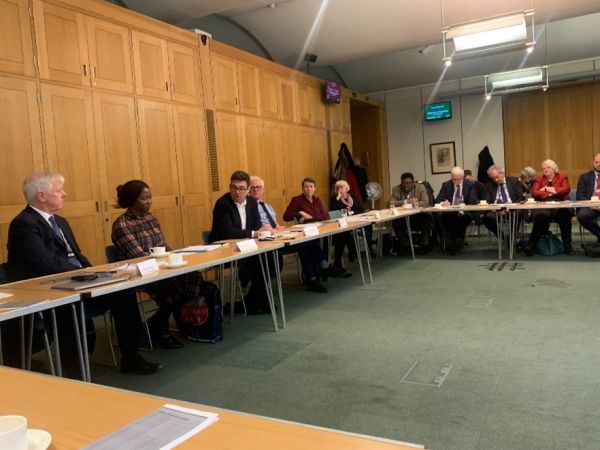Engaging with elected representatives and decision makers
UK Labour and Conservative Party Conferences
In September and October, the Policy team made a robust case for counselling and psychotherapy at the 2022 UK Labour and Conservative Party Conferences.
We held meetings and attended fringe events, speaking with key decision makers around a range of topics in mental health. Recurring themes focused on the importance of counselling in prevention, improving data sharing and the economic case for investment in mental health support.
Our well-attended event at the Labour Party Conference, held in partnership with UKCP, BPC and IPPR, discussed the long-term impacts of the pandemic on the mental health of the nation. We looked at how mental health services, including counsellors and psychotherapists, can be deployed to help steer the nation through such challenging times. The panel included our Deputy CEO, Fiona Ballantine-Dykes, and Dr Rosena Allin-Khan, the Shadow Mental Health Minister, who endorsed the crucial work of our members saying: "It has been wonderful to join BACP at the Labour Party Conference for an incredibly insightful event alongside the IPPR. Counsellors and psychotherapists do incredible jobs, in increasingly challenging circumstances.”
We also attended the Conservative Party Conference in Birmingham, having conversations with representatives from charities such as Mind and the Samaritans, as well as policymakers including the Conservative Mental Health Group and the former Secretary of State for Health, Therese Coffey. It was also a privilege to join BACP's Vice President Julia Samuel, who chaired a session on the work of the UK Commission on Bereavement, where she is a commissioner.
Attending the 2022 Party Conferences was extremely beneficial to our public affairs work and cemented the mental health sector as a united front in the eyes of politicians and decision-makers.
Influencing guide
To coincide with the Party Conferences, we launched the BACP Influencing Guide. This describes the ways members can use their voices and experiences to champion the profession in the eyes of policymakers and strengthen our existing public affairs work.
The guide contains our key policy messages in all Four Nations, alongside influencing and engagement ideas and a section on the best ways to make an impact when writing to your elected representatives.
Our Policy and Public Affairs Officer, Karan Chhabra, said:
“Party conference season gives us an important opportunity to champion counselling and psychotherapy on behalf of members. But we can’t do this alone. The voices and experiences of our members are critical to the success of our public affairs work.
“Our members have backed our campaigns for improved access to talking therapies and helped us give politicians and decision makers a better understanding of the need for, and value of, therapy.
“We know our members are incredible busy, so we hope our Influencing Guide will support them in grabbing the attention of policymakers to help shape the future of our profession.”
Shadow Education Team meeting
Jo Holmes and Karan Chhabra met with Labour Party representatives from Bridget Philipson’s shadow education team to discuss funding for school counselling across schools and colleges in England.
The Labour representatives shared their continued commitment for additional funding for school counselling provision and their intention to include this in the next manifesto. We shared information on appropriate training, children and young people competences and up-to-date statistics from BACP’s workforce survey, highlighting that registered and accredited members, working specifically with children and young people, had capacity to take on more paid work.
Citizens UK event
In November, Jo Holmes was invited to speak at a Citizens UK Assembly in Brighton and Hove, to a packed audience of residents, young people, parents and carers, organisational representatives and local commissioners. Two community asks had been forwarded from the previous year; to make Brighton and Hove a fair pay city and for localised funding for a school counselling pilot across all schools and colleges.
The leader of the council and the leader of the local health trust were asked to jointly fund the school counselling pilot at a cost of £2 million. The figures were calculated by a funding proforma which we had provided to Citizens UK. Both officials were on the stage throughout the evening and heard a series of testimonials to support the asks.
Jo highlighted the key findings from the Citizens UK pilot school counselling programme in North-East Newcastle, where our journey with Citizens UK first began. She also shared the continued commitment from our research team to support any further pilot programmes.
Although no funding was secured on this occasion, the leader of the council promised to have further talks. Jo was interviewed live on BBC South-East news following a lead story on children’s mental health and the call for funding additional school counselling services.
Jo invited other key stakeholders she’s been working with over the last two years to the event, including Julian Rose and Ruth Simmonds, who jointly set up the TAC Access platform for commissioners to directly contract school counsellors. TAC Access continues to sign up children and young people specialist counsellors for free.
Talking Therapies Collaborative – Norfolk
Jo has been working closely with Norfolk and Waveney NHS Trust as part of a steering group of talking therapy practitioners from a range of professional bodies. The group is looking at guiding principles and practice linked to commissioning out children and young people’s counselling provision (and other evidence based talking therapies) to help reduce NHS mental health waiting lists and, ultimately, meet the needs of local service users.
Alex Church MBACP is leading on implementing this provision, based on a model he led on in Bradford. He has a consultancy role to develop integrative CYP access across Norfolk. The YMCA recently won a bid to be the lead organisation to manage the programme and will work closely with Norfolk’s single point of access system, triaging counselling sessions to other providers.
Alex has a longer-term vision for rolling out this model of work across other integrated care systems. He hopes to develop a national community of practice to replicate this model in other areas, resulting in paid work for CYP counselling practitioners.
Healthcare
We've continued to work constructively with NHS England and Health Education England on their plans for expanding the psychological therapies workforce, as part of the NHS Long Term Plan commitments. This has included shaping the continued roll out of the ground-breaking psychotherapeutic counselling core training pilot, which is being funded and salaried by NHS England, as well as looking at the role for counsellors and psychotherapists in creating a more psychologically informed NHS.
The regional Psychological Professions Networks have launched their regional workforce councils over the past year and, alongside practitioners working in those regions, we're representing counselling and psychotherapy on each of these groups. This is giving us a greater voice to challenge workforce concerns at a regional level across England – including pay inequity where it has been highlighted.
In Wales we began an exciting new programme of work to engage more closely with the regional health boards on the availability of counselling and psychotherapy for adults in Wales and how our members can help meet workforce need.
Engaging with members
Counselling in communities
In October we held the first event for leaders of third sector organisational members. The online event was attended by 120 people and featured presentations and Q&As on topics of unpaid work, relationships with NHS bodies, and increasing access to training for students from racialised community backgrounds.
In their feedback, attendees rated the event highly and called for more similar events and the need to reflect experience in all UK nations.


Racism, racial trauma and anti-racism podcasts
In September, Jo Holmes and Jeremy Bacon joined EDI Lead Edith Stokes to record a series of podcasts in partnership with Hackney Borough Council. The collaboration followed our attendance at a conference run by Hackney Council in May 2022 which addressed issues of race, racial trauma and anti-racist action.
Five episodes have been produced featuring conversations on topics including unmasking racism, allyship and leadership. The recordings include outgoing BACP president David Weaver and BACP Deputy Chair, Michael Golding.
Talks, presentations and discussions
In September our Workforce Lead, Kris Ambler, co-presented a session on how to tackle trauma with accredited service Kooth at the Emergency Services Show in Birmingham. Focusing on trauma informed services and the use of digital therapy, the session attracted more than 200 visitors from stakeholder organisations including commissioners, policy makers and emergency services lead officers.
As part of a programme of activity aimed at strengthening relationships with some of the UK’s largest EAP employers, Kris delivered a CPD workshop for clinical leads at the Optima Health Group, promoting the Workplace Counselling Competencies Framework. He also recorded a talk on how employers can use the workplace competencies within their counselling service for Optima to use in future CPD sessions. This will be developed into a podcast series for wider use in the future.
Kris also gave a talk on counselling careers for psychology undergraduates at Arden University and met with Hereward Proops MBACP (Accred) and Professor Sarah-Ann Munoz to discuss joining the Global Collaborative for Rural Mental Health (GCRMH) and the potential for future research collaboration.

Workforce engagement
In October Kris met with the organisers of The Watercooler 2023 event, in association with the Evening Standard, to discuss joining its speakers panel. Together with representatives from the Money and Mental Health Policy Institution and Lloyds Bank, he will be talking about financial wellbeing, mental health and workplace counselling.
He continued a programme of employer engagement throughout November, aimed at raising awareness of the key mental health challenges affecting industry groups such as blue light services and agriculture, and promoting the value of investing in counselling.
He met with Rachel Moriarty, Associate Director of Impact at the Royal Foundation, to support the development of the Foundation’s Mental Health Strategy, drawing on BACP workforce survey data and research. He also met Rachel Suff, Public Policy Lead for Employment Relations and Health and Wellbeing at the CIPD and Charlie White, Group Corporate Affairs Manager, John Lewis Partnership, to inform the development of a ‘state of the sector’ report on mental health in the retail sector.
Four nations view
Northern Ireland
Despite the ongoing political uncertainty in Northern Ireland, we're continuing to make a strong case for further investment in counselling and psychotherapy.
In September, Steve Mulligan attended a dedicated event on the Mental Health Implementation Plan with providers and other stakeholders across Northern Ireland. Steve called on the Department for Health to ensure that counselling is included within the upcoming review of the mental health workforce.
In October, we provided a robust response to the pre-consultation on postvention support within the Suicide Action Plan, Protect Life 2, in partnership with the Northern Ireland Counselling Forum. Our response highlighted that despite counselling being the intervention most mentioned and requested in the consultation (by 95.96% of respondents), it was not advocated within the draft action plan but instead was included within 'therapeutic interventions'.
Scotland
In the second half of 2022, Steve represented BACP at the monthly meetings of Scottish Government’s Student Mental Health and Wellbeing Working Group, chaired by Further and Higher Education Minister, Jamie Hepburn MSP. We used our position on this group to extend counselling funding beyond the current academic year.
In 2018, we successfully campaigned with NUS Scotland and other partners for the Scottish Government to commit to a four-year programme of counselling in colleges and universities, underpinned by £20m investment. At the December meeting we were given assurances that funding has been secured beyond this, with more detail to follow in the new year.
Wales
In September, Steve attended workshops led by Health Education and Improvement Wales and Social Care Wales to inform the development of a new Mental Health Workforce Plan, a key commitment within the Welsh Government’s Together for Mental Health Delivery Plan 2019-22. This was an important opportunity to ensure that counselling and psychotherapy are fully represented within the emerging plan as part of their ongoing consultation.
In October, we responded to the draft action plan to end the abuse and neglect of older people in Wales, highlighting the importance of ensuring that funded and accessible mental health support is provided, including counselling and psychotherapy.
In 2023 we'll be working to engage the NHS in Wales at national and board level, to develop opportunities for our members. Steve talked about this at our Making Connections event in Cardiff in February.
Devolved England
We're currently sponsoring the work of the Health Devolution Commission (HDC), co-chaired by Andy Burnham (Major of Greater Manchester and former Labour Secretary of State for Health) and Norman Lamb (former Lib Dem/Coalition Health Minster). It also includes three other former Health Ministers and representatives from LGA, the NHS Confederation and Chairs of the new Integrated Care Boards.
In December, Steve represented BACP at the parliamentary launch of HDC’s report on Integrated Care Systems - 'ICSs: a Great Deal Done – a Great Deal More to Do'. There was almost universal support and endorsement of the report's findings which includes our calls for ICSs to:
- improve primary care mental health services, maximising the impact that the existing Improving Access to Psychological Therapies (IAPT) services can have for their diverse local populations
- augment this with additional mental health services and with providers from the VCSE sector
- develop a fully funded post-covid mental health recovery plan for their area supported by a robust workforce development strategy which covers all elements of the mental health sector, including counselling and psychotherapy.

For further information about any of the articles in this issue, or to speak to our Policy team, please email publicaffairs@bacp.co.uk
